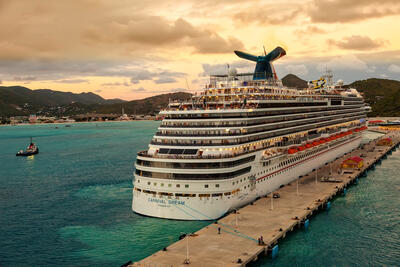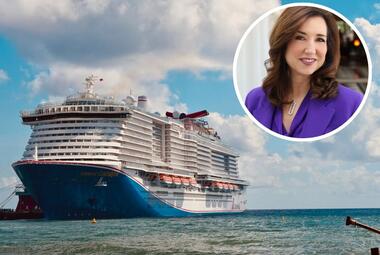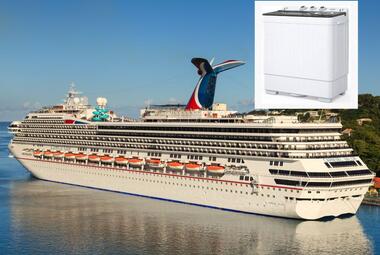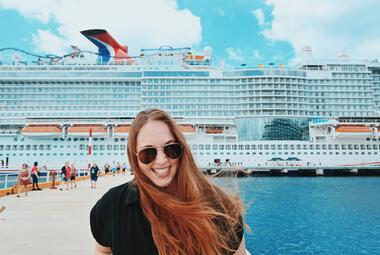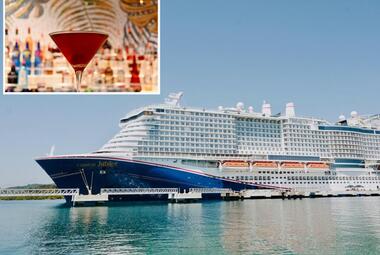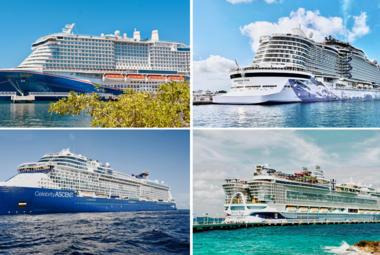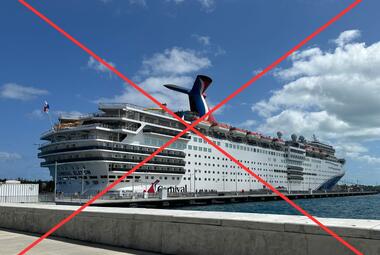California's new consumer protection law will alter how Carnival advertises its cruise fares. Starting on July 1, 2024, the price must include many components of the current taxes, fees, and port expenses that are left out. It's meant to provide guests with a clear price upfront, rather than leave them surprised by additional fees later on during the booking process.
The change is simply meant to enhance transparency. It neither impacts the total price of the cruise nor the portion of the fare that's commissionable to travel agents.
Beginning in July, the current total taxes, fees, and port expenses will be separated into two separate parts: Government Taxes and Fees and Required Cruise Fees and Expenses. They'll both be included in the advertised price and will be shown in the detailed price confirmation. No changes will be required to existing bookings made on or before June 30, 2024.

For instance, if Carnival Cruise Line's website is advertising a fare that's $849, the fees will be broken down in the final stage of the booking process. In this case, they may amount to $100 in Required Cruise Fees and Expenses and $50 in Government Taxes and Fees. They're, however, included in the total cost, meaning that the fare itself is close to $699. This leaves little to surprise guests with, especially with some port fees amounting to hundreds of dollars per person.
This change was sent in an email from Cunard to travel agents to inform them of the policy change that will impact Carnival Corporation's brands, including Princess Cruises, Holland America Line, Cunard North America, and, of course, Carnival Cruise Line. The brands will follow this advertising requirement for all consumer advertising throughout the U.S. and Canada to avoid confusion regardless of where the traveler is trying to sail.
Additionally, the email clarified that the change won't impact the commission paid to travel agents. "In all Travel Advisor disclosures," the email states, "we will provide a full breakout of the pricing to document the portion that is commissionable."
Cancellation fees will be assessed based on the total advertised price, minus the Government Taxes & Fees

Though nobody wants to think about having to cancel their highly-anticipated cruise, life's not always willing to grant exceptions.
Using the same example as above, if the advertised rate is $849, with $50 being attributed to the Government Taxes & Fees, then the cancellation fee will be based on $799. In the event of any cancelations, refunds will be provided for the Government Taxes & Fees.
On the topic of cancelations, it's on the individual to assess whether they want to purchase travel insurance or not. Though you might not want to shell out additional money to cover events that may never happen, insurance helps give you peace of mind if things don't go as planned, including unforeseen medical emergencies, travel delays, etc. Since insurance is optional, it's never included in the advertised price.
Carnival will still be able to offer "free" perks

In order for Carnival to be able to offer free third and fourth guests, for instance, the following disclaimer will have to be included in the terms and conditions:
"These types of promotions will be permitted but the following disclaimer will need to be included in the terms and conditions: Complimentary (free) cruise offer applies to cruise fare only for offer recipient and guests covered by the complimentary cruise offer (if any) and excludes Government Taxes & Fees (approximately $X to $XX), any required deposit ($X), Required Cruise Fees & Expenses, (approximately $X to $XX), and other cruise-related expenses and travel expenses. Actual amounts owed by recipient and applicable guests may vary and shall be calculated at the time of booking."
What are port fees?
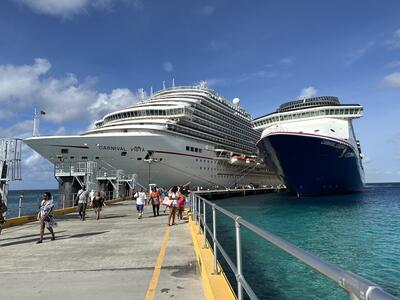
Port fees are charged by each port of call to allow the ship to dock. In turn, the cruise line passes the fees on to passengers. It doesn't matter if you're staying in a lavish two-bedroom suite or a standard inside cabin, everyone onboard will pay the same amount. Additionally, unlike gratuities, port fees are part of your total cruise fare and must be paid in full by the time of final payment.
Typically, they're a summation of a few different fees, including the per-passenger (head tax) fee, docking fee, and pilot fee. The latter covers all costs associated with the local harbor pilot who is brought onboard to help guide the cruise ship into port, while the head tax is charged to offset the cost of guests using the local infrastructure. Finally, the docking fee is what the local authorities charge to the cruise line for the right to dock in port and pay for all of the services required.
According to Carnival Cruise Line, "Taxes, Fees & Port Expenses may include U.S. Customs fees, head taxes, Panama Canal tolls, dockage fees, wharfage fees, inspection fees, pilotage, air taxes, hotel or VAT taxes incurred as part of a land tour, immigration and naturalization fees, and Internal Revenue Service fees, as well as fees for navigation, berthing, stevedoring, baggage handling/storage and security services."
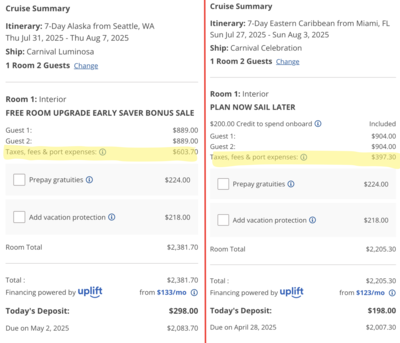
The total cost of port fees varies. Alaska, for instance, is known for higher fees, while those in the Bahamas and Caribbean tend to be far less. When browsing Carnival's website for July 2025, a 7-night cruise to Alaska onboard Carnival Luminosa charges over $300 per person in taxes, fees, and port expenses. In comparison, the fees for a 7-night Eastern Caribbean cruise on Carnival Celebration come in at around $200 per person.
Though both cruise fares are around the same price ($889 vs $904 per person), the cruise to Alaska is more expensive, costing two people around $2,300. With the new law, port fees will have to be included in the advertised price and not added at the final stage of booking.
This will give potential cruises a better understanding of the true cost of their cruise upfront, helping them make informed decisions when comparing vacation options. Before getting your hopes up, you'll be able to understand whether or not the deal is actually too good to be true or not.


